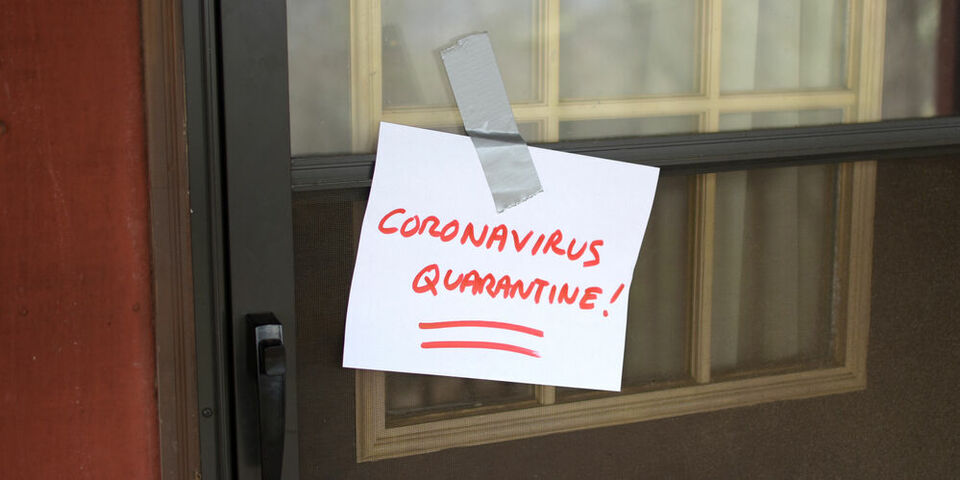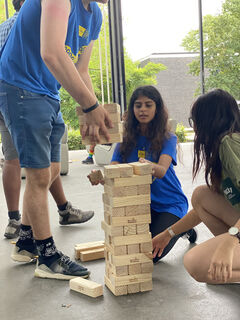Quarantine advice for three quarters of new TU/e internationals
Based on the list of confirmed international students who will come to TU/e this academic year, an estimated 595 new Bachelor’s and Master’s students are supposed to self-quarantine, still need to do so at later stage, or have self-quarantined already.
The world is predominantly orange at this point, with a few red and yellow areas here and there. It almost sounds like a weather report, but the advices issued by the Dutch Ministry of Foreign Affairs have changed the colors of the world at a rapid pace. As a result, it has become unlikely that the country an international student travels from is designated yellow, without a quarantine advice. This means that 75 percent of the number of confirmed international students are required to self-quarantine.
The number of Master’s students who are required to quarantine is 183 out of a total of 240. Among Bachelor’s students (624 in total), that number is 412. According to the lists of TU/e’s International Office, 5 Master’s students and 69 Bachelor’s students have the Dutch nationality and received their pre-education abroad. They were excluded from the percentage calculation.
Clearly communicated
The International Office clearly communicated the importance of quarantine to the students, but quarantine control is not possible. The Dutch government still strongly advises people to self-quarantine but has not made quarantine mandatory, nor can it impose sanctions. “Nevertheless, the International Office consistently sends students the message that they are required to self-quarantine,” says Sarah van den Nieuwenhof-Cooper, coordinator at the International Office. “Students were informed about this via mail, and they subsequently were made aware of this once more during the welcome webinars, as well as in the information provided by the TU/e Intro-app and the website.”
The number of students currently self-quarantining, or who have already done so, is not recorded. However, International student association Cosmos is in close contact with international students and notices the continuous arrival of new students who either need to quarantine, or who are currently doing so. This can sometimes lead to problems, particularly for internationals who are new to the Netherlands.
“Quarantine is especially difficult for them since they don’t have a citizen service number, Dutch phone number, and access to certain services yet,” says Andres Baroja Sierra, treasurer at Cosmos, “And it takes some time before you’ve become accustomed to Dutch bureaucracy, which can be very confusing to internationals. During the search for a living space, for example, when opening a bank account, or when registering with a general practitioner. A major problem that students run into, we’ve noticed, is that they can’t visit potential living accommodations because they need to self-quarantine directly upon arrival. As a result, they are forced to search for costly temporary accommodations for the duration of their quarantine. But that doesn’t apply to all quarantining students, fortunately. This situation has become a strange kind of normal for many of them.”
Webinar as a start
All new international students were invited to attend a webinar on Monday 17 August, an option that needed to ensure that quarantining students too could be informed about all the important practical matters they need to take care of during the first few weeks. This includes applying for a bank account, collecting a residence permit, registering with the municipality of Eindhoven or at TU/e, etcetera. Van den Nieuwenhof-Cooper: “Those webinars, of which there were three, were well attended by the internationals. During my presentation in the first half of the webinar, I talked about the quarantine measures as well and referred students to our information about this on the TU/e site and in the Intro-app. And I also referred them to Cosmos, naturally, adding that our international students are the experts when it comes to settling in the Netherlands.”
Van den Nieuwenhof-Cooper says that is was agreed with Cosmos that they will deal with questions and problems students might have during quarantine. “It’s possible that a student wants to chat with another international student just to have some human contact. But the members of Cosmos can also be very helpful in solving practical problems during quarantine.”
Cosmos quickly offered a helping hand with their Discord channel #quarantine-help, among other things. This allows students to ask for help with groceries during quarantine, for example. In addition, there’s a WhatsApp group for new students. Those who are interested can contact Cosmos.
Missing the Intro
Contact with Cosmos can be especially helpful now, during the start of the new academic year. What if you can’t take part in the Intro because of your quarantine? “Unfortunately, we do know of a few cases where internationals could not take part in the Intro because of their quarantine,” Andres Baroja Sierra says. “But on the other hand, we’ve also seen Intro parents who even took the trouble to livestream the campus market on the Green Strip for their Intro kids who were quarantined, so that they could have the best possible home experience. Cosmos also finds it important that no one falls behind as a result of having followed the safety guidelines. That is why all our other Intro-related events will take place offline in September. We will organize events with pizza during the first two weekends in September, during which new students - Bachelor’s and Master’s - can get to know each other on the campus. These events also include a campus tour and activities at the Student Sports Centre.”
Disclaimer
At the time of writing this article, the list of travel advisories issued by the Ministry of Foreign Affairs was crossed with the ‘nationalities’ list of the International Office. The Ministry’s list is updated daily, which means that it could differ slightly when the lists are crossed once again later. In addition, there are a few comments: American nationals don’t necessarily travel from the US, for example when he or she already lives in Europe, or in the Netherlands even. And someone with Chinese nationality could have travelled through both China and Italy before entering the Netherlands.
There are no lists available of countries where all students reside. This calculation was based on the assumption that the nationalities mentioned at least travel from or through their own countries. We can therefore not draw any firm conclusions, instead we offer an indication. What can be said with certainty however, is that internationals in particular need to self-quarantine. In addition, we naturally also have to factor in (Dutch) vacationers returning home and who were not included in this calculation.
Countries with a mixed advice - such as Belgium, France and Sweden, where certain regions are orange, but others yellow - were counted as orange in the calculation, since it is not known whether someone travelled through any of these countries, although it seems likely because important airports and train stations were usually located in orange areas.



Discussion